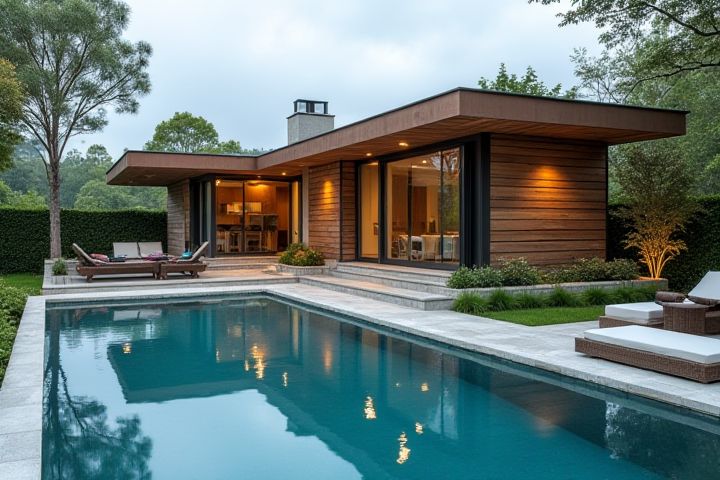
Adding a pool to a small house can enhance your outdoor living space and increase property value. Consider the type of pool that best fits your yard, such as an above-ground pool for limited space or an inground pool if your layout allows it. Incorporate features like a deck or patio for lounging and entertaining, ensuring they complement your home's design. Check local zoning laws and permits, as regulations may dictate pool dimensions and build locations. With careful planning and design, you can create a refreshing oasis in your compact backyard.
Can You Add A Pool To A Small House
Local zoning regulations
Before adding a pool to your small house, it's essential to review local zoning regulations, which can dictate the size, placement, and type of pool allowed. These regulations often include setback requirements, which specify how far the pool must be from property lines and structures. In many areas, you'll also need to consider safety fencing, drainage restrictions, and any permits necessary for construction or excavation. Consulting with your local planning department can provide clarity on these regulations and help ensure that your pool installation complies with all necessary codes.
Available backyard space
If your small house has sufficient available backyard space, adding a pool can enhance your outdoor experience and increase property value. Consider choosing a compact pool design, such as a plunge pool or an above-ground option, which can fit comfortably without overwhelming your yard. Landscaping around the pool, including deck space or lounge areas, can optimize functionality while maintaining aesthetic appeal. Proper planning and local regulations will ensure that your pool installation meets safety standards and complements your small home environment.
Pool type and design options
Incorporating a pool into a small house can enhance your outdoor space significantly, with options such as plunge pools, lap pools, and above-ground pools providing unique benefits. A plunge pool typically measures around 7 to 10 feet in width, making it ideal for limited yard space while offering a refreshing retreat. You might also consider a lap pool, which generally spans 30 to 40 feet in length, perfect for fitness-minded homeowners who wish to maximize their smaller yards with a functional design. For a budget-friendly option, above-ground pools come in various shapes and sizes, allowing you to create an inviting oasis without the extensive installation hassles of in-ground pools.
Cost and budget considerations
Adding a pool to a small house involves careful cost and budget planning. The average price for an in-ground pool installation ranges from $30,000 to $70,000, depending on size, materials, and additional features such as heating systems or landscaping. You must also consider ongoing expenses, like maintenance, insurance, and increased utility bills, which can add another $1,000 to $5,000 annually. Opting for above-ground pools or smaller designs can help keep your costs manageable while still enhancing your outdoor living space.
Impact on property value
Adding a pool to a small house can enhance your property value by up to 7-15%, depending on local market trends and appeal. Residential pools often attract families and buyers seeking leisure and entertainment options, increasing the overall desirability of your home. However, it's essential to consider the initial investment, which can range from $15,000 to over $50,000 based on the pool type and installation specifics. Local regulations and climate also play significant roles in whether a pool will genuinely boost your property value, so consulting real estate experts is advised.
Pool construction permits
When planning to add a pool to a small house, obtaining the necessary pool construction permits is essential. Local zoning laws may dictate the type, size, and location of the pool, ensuring that it complies with safety and aesthetic regulations. You must typically submit blueprints and site plans to your local building department, detailing the pool's design and its distance from property lines. Be aware that permits may also include inspections for electrical and plumbing work related to the pool installation.
Maintenance requirements
Adding a pool to a small house can be a rewarding enhancement, but it significantly increases maintenance requirements. Regular tasks will include skimming debris, balancing water chemistry, and cleaning the pool filter to ensure optimal water quality and clarity. You'll also need to maintain the surrounding area, which might involve landscaping, patio upkeep, and ensuring safety barriers meet local regulations. Understanding these ongoing commitments is essential to enjoy your pool fully without becoming overwhelmed by maintenance challenges.
Safety features and fencing
Adding a pool to a small house can enhance your outdoor space, but prioritizing safety features is essential. Install a sturdy, self-closing gate and a secure fence around the pool, ideally at least four feet high, to prevent unauthorized access, especially for children and pets. Consider adding pool covers for additional safety, as they can prevent accidental falls while also keeping debris out. Installing approved pool alarms can provide an extra layer of protection, alerting you if someone enters the water unexpectedly.
Landscaping integration
Incorporating a pool into a small house requires strategic landscaping to create a harmonious outdoor space. A compact pool measuring around 10 feet by 20 feet can fit nicely while maintaining an open feel. Surrounding the pool with native plants not only enhances aesthetics but also minimizes water consumption, making it eco-friendly. Thoughtfully placed hardscaping elements such as stone patios and pathways can effectively link the pool to your home, ensuring a seamless flow within the outdoor environment.
Drainage and water supply
Incorporating a pool into a small house requires careful consideration of drainage and water supply systems. The average residential pool can demand anywhere from 30,000 to 50,000 gallons of water, necessitating a reliable water source such as municipal supply or a well. Effective drainage solutions, such as a French drain or sump pump, help manage water runoff and prevent flooding, ensuring proper water flow away from your home. Moreover, building a pool with a filtration system will also enhance water quality, requiring regular maintenance to sustain clear and clean pool water.
